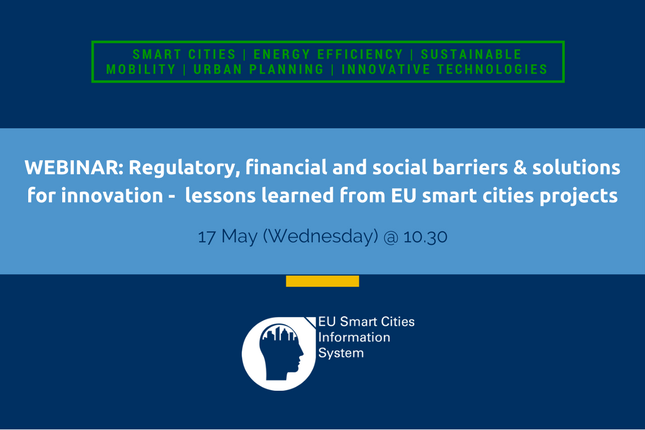
The challenge to develop smart cities is not only a technological challenge but also a regulatory, financial and social one. In fact, some non-technical issues may be more challenging to resolve than the technological barriers and the success of a project can depend on this.
By aggregating best practice and lessons learned from projects implemented across Europe, the Smart Cities Information System (SCIS) provides a valuable repository of information for all smart city stakeholders.This webinar aims to present the SCIS framework for addressing non-technical issues in the fields of Energy, Mobility & Transport and ICT by showcasing examples of:
- Main financial and economic barriers encountered by smart cities projects related to access to capital or various risks and uncertainties
- Regulatory and administrative barriers such as restrictive or changing regulatory regimes, regulations and standards, administrative capacity and burdens
- Measures needed to promote social acceptance and uptake of technologies and solutions among stakeholders and the lifestyle and behavioural aspects that should be addressed to ensure their widest possible implementation.
The EU-funded projects REMOURBAN and City-zen will contribute by sharing their own experiences with non-technical challenges they have encountered and will provide recommendations to smart city stakeholders.
The webinar will take place on 17 May (Wednesday), 10:30 - 11:30. Register here.
Speakers
- Jorge Nuñez-Ferrer, Centre for European Policy Studies (CEPS)
Jorge is Senior Research Fellow at the Centre for European Policy Studies (CEPS) and holds a PhD from Imperial College of the University of London. He is a recognised specialist in EU budgetary and financial instruments, and is also involved in EU smart city policies. He has worked as academic, EC official and consultant for governments on strategic planning for EU structural funds. Between 2010 and 2012 he chaired the Finance Group of the Smart Cities and Communities Stakeholder Platform of the EU. He is one of the authors of the International Electrotechnical Commission’s white paper “Orchestrating infrastructure for sustainable Smart Cities”. Presently, he is also involved in the future reforms of the EU’s budget and financial instruments and has led the background study on EU resources for the High Level Group on Own Resources led by Mario Monti
- Miguel Á. García-Fuentes, CARTIF Technology Centre
Miguel is European Projects Coordinator at the Energy Division of CARTIF Technology Centre. He is an expert is in the field of Smart Cities and Nearly Zero Energy Cities, focusing on energy performance improvement, Energy Performance Simulation (BEPS) and BIM. He participated in the coordination of the EU-FP7 funded projects BaaS and R2CITIES. Currently he works as Project Coordinator of REMOURBAN and OptEEmAL EU-H2020 funded projects.
- Craig Martin, Delft University of Technology
 Dr Craig Lee Martin is Ass. Professor of Climate Design & Sustainability at TU Delft. His academic career began at The Manchester School of Architecture (MSA, UK) where as Head of Technology his primary motivation was to increase the architectural awareness of climate change, and to create an educational environment and attitude that could respond to it at all urban scales of design enquiry. Craig is currently responsible for the SWAT Studio and City-zen Roadshow, both ‘on-site’ urban intensive workshops that collaborate with institutions and city stakeholders all over the world to propose vital and realizable sustainable City Visions.
Dr Craig Lee Martin is Ass. Professor of Climate Design & Sustainability at TU Delft. His academic career began at The Manchester School of Architecture (MSA, UK) where as Head of Technology his primary motivation was to increase the architectural awareness of climate change, and to create an educational environment and attitude that could respond to it at all urban scales of design enquiry. Craig is currently responsible for the SWAT Studio and City-zen Roadshow, both ‘on-site’ urban intensive workshops that collaborate with institutions and city stakeholders all over the world to propose vital and realizable sustainable City Visions.
